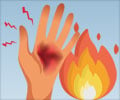Are women treated differently in hospitals? Women often face delays and receive less pain medication than men, revealing a gender bias in treatment.
- Women are less likely than men to have their pain taken seriously in emergency rooms
- Gender bias in pain perception leads to women receiving less pain medication and longer wait times
- Awareness and technology could help reduce unconscious bias in pain management
Data reveal how doctors take women's pain less seriously than men's
Go to source).
In ancient times, pain was often seen as a test of character, with men encouraged to be stoic and women dismissed as hysterical. Unfortunately, these stereotypes still influence medical care today. #genderbias #healthcare #medindia’
Bias in Pain Perception: Women Viewed as 'Hysterical', Men as 'Stoic'
The findings, published in Proceedings of the National Academy of Sciences, demonstrate how unconscious bias might influence our judgment of other people's suffering experiences. "Women are viewed as exaggerating or hysterical, and men are viewed as more stoic when they complain of pain," says co-author Alex Gileles-Hillel, a physician-scientist at Hadassah-Hebrew University Medical Center in Jerusalem.Gender Disparities in Emergency Room Treatment: Women Face Delays and Less Pain Relief
Gileles-Hillel and colleagues evaluated the magnitude of this prejudice in emergency rooms in Israeli and American hospitals. They examined over 20,000 discharge records from patients who presented with 'non-specific' pain symptoms — those with no evident underlying cause, such as headaches.The study discovered that when women first arrived at the hospital, they were 10% less likely than males to have a recorded pain score – a number from 1 to 10 given by the patient that helps clinicians determine the severity of pain. After the initial examination, women waited an average of 30 minutes longer than males to see a doctor. They were less likely to be given pain medication. This pattern persisted independent of the gender of the nurse or doctor. "Women can hold the same stereotypical views as men about women's pain," adds Gileles-Hillel.
Healthcare Professionals' Bias: Male Patients' Pain Rated Higher Than Females'
The researchers also investigated how 100 healthcare professionals interpreted patients' discomfort. Participants were shown a scenario involving a patient with significant back pain and given the patient's previous clinical information. The patient profiles were identical except for gender. Participants consistently assigned higher pain values to the male patient than the female patient. This pattern persisted independent of the gender of the nurse or doctor. "Women can hold the same stereotypical views as men about women's pain," adds Gileles-Hillel.The researchers also investigated how 100 healthcare professionals interpreted patients' discomfort. Participants were shown a scenario involving a patient with significant back pain and given the patient's previous clinical information. The patient profiles were identical except for gender. Participants consistently assigned higher pain values to the male patient than the female patient.
Addressing Bias in Pain Management: Role of Awareness and Technology in Healthcare
"One of the reasons we see this in the pain setting is because there are no objective measures of pain, so the physician must rely on the patient's account. Diane Hoffmann, a healthcare law researcher at the University of Maryland in Baltimore, believes this allows for more bias. She adds that the problem should be raised throughout medical school to provide physicians with a better understanding of pain and the possibility of prejudice when treating it.A more immediate option that Gileles-Hillel wishes to investigate is whether employing computer systems to generate reminders is sufficient to improve fairness. For example, an alert may tell a doctor to prescribe medicines when a patient reports a high pain score, regardless of gender. "Physicians are not aware of this bias," he claims. "Raising awareness is one solution."
Reference:
- Data reveal how doctors take women's pain less seriously than men's - (https://www.nature.com/articles/d41586-024-02547-7)
Source-Medindia











